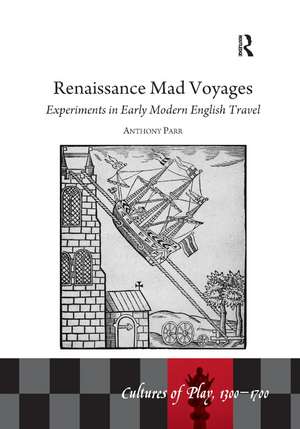Renaissance Mad Voyages: Experiments in Early Modern English Travel
Autor Anthony Parren Limba Engleză Paperback – 12 dec 2019
| Toate formatele și edițiile | Preț | Express |
|---|---|---|
| Paperback (1) | 260.33 lei 43-57 zile | |
| Taylor & Francis – 12 dec 2019 | 260.33 lei 43-57 zile | |
| Hardback (1) | 769.10 lei 43-57 zile | |
| Taylor & Francis – 16 iun 2015 | 769.10 lei 43-57 zile |
Preț: 260.33 lei
Preț vechi: 311.59 lei
-16% Nou
Puncte Express: 390
Preț estimativ în valută:
49.81€ • 52.15$ • 41.22£
49.81€ • 52.15$ • 41.22£
Carte tipărită la comandă
Livrare economică 07-21 aprilie
Preluare comenzi: 021 569.72.76
Specificații
ISBN-13: 9780367881030
ISBN-10: 0367881039
Pagini: 256
Dimensiuni: 174 x 246 mm
Greutate: 0.47 kg
Ediția:1
Editura: Taylor & Francis
Colecția Routledge
Locul publicării:Oxford, United Kingdom
ISBN-10: 0367881039
Pagini: 256
Dimensiuni: 174 x 246 mm
Greutate: 0.47 kg
Ediția:1
Editura: Taylor & Francis
Colecția Routledge
Locul publicării:Oxford, United Kingdom
Cuprins
A very English journey? Strange returns and performances. Two prodigious feats . Bills of adventure. Gambling, wagers and the law. Orpheus in the Underworld.
Recenzii
'Renaissance Mad Voyages is one of those exciting scholarly books that make you realize how important and interesting its apparently obscure subject is. Parr provides a rich historical contextualization for the English "mad voyage" which demonstrates that it is caught up in, and also a vivid epitome of, the main currents of shifting religious, economic, and colonialist practices for at least 200 years. Historians and literary critics alike will find it engagingly written, magisterial but never overwhelming in its command of historical detail, and skillful in making a wide range of unfamiliar texts legible and accessible.' Jeremy Lopez, University of Toronto, Canada 'Anthony Parr displays a firm grasp of early modern cultural history in this charming but scholarly account of recreational travel and madcap journeys and adventures. His deep research in Elizabethan and early Stuart texts yields vivid vignettes of ingenious stunts, scams and wagers, pioneer tourism, and the feats of English eccentrics. Parr illuminates the worlds of London finance, legal chicanery, and literary reputations, while tracing intrepid travelers across the British Isles and as far afield as Venice, Istanbul, and Jerusalem. This is a lucid and illuminating work that displays a warmth and sympathy toward its subjects, and respect for the work of other scholars.' David Cressy, Ohio State University, USA
Notă biografică
Anthony Parr is Professor Emeritus of English at the University of the Western Cape, South Africa.
Descriere
The first full length scholarly work to focus on the travel ’stunts’ that flourished in England between 1590 and the 1620s, this study shows that the phenomenon of the ’mad voyage’ had deep and diverse roots in traditional travel practices, in courtly play and mercantile custom, and in literary culture. Parr explores the role of these exploits in a
